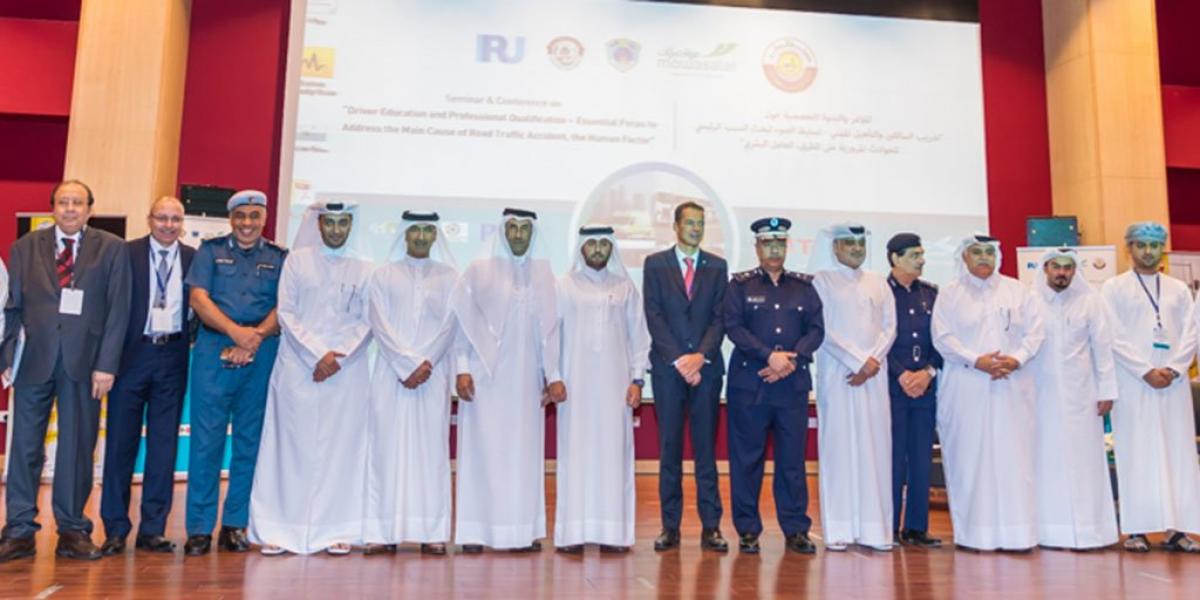Doha-Qatar
The 8th annual seminar and workshop on reducing road traffic accidents began today. It is organized by Karwa in cooperation with the International Road Transport Union (IRU), in partnership with the General Directorate of Traffic and the National Traffic Safety Committee.
The conference will be held over two days and will include panel discussions and presentations featuring a range of national and international road safety experts covering the latest ideas on education, law enforcement, road and vehicle engineering.
Mowasalat Chairman Nasser bin Mohammed Al Malki said today that the company is committed to the highest levels of service, in addition to spreading the culture of traffic safety. He stressed the importance of focusing on the transport industry, especially that the transportation system is the main engine of new investments and the heart of economic growth and social development. He then highlighted that the company was working with the designated authorities on limiting the number of accidents.
Meanwhile the Ministry of Transport and Communications, the strategic sponsor of the event, stressed that the transport sector is one of the most important non-oil sectors in the country and is the fastest growing and contributing to the local GDP. They added that the sector can be characterized by its great dynamism, wide variety and ability to influence the overall development process in the State of Qatar.

Head of the Land Transport Licensing Department HE Sheikh Nayef bin Abdulrahman Al-Thani, who is also the acting head of the department of quality of land transport services at the Ministry of Transport and Communications, said that the State of Qatar has witnessed rapid population growth over the past few years, accompanied by strong economic expansion, necessitating further developments and modernization of the transport infrastructure, and providing services that meet the highest international standards.
He pointed out that pointed out that the Ministry's mission is not only to establish a world-class road infrastructure and to provide an effective, economical and safe road transport system but also to improve the level of road safety and minimize accidents and losses resulting from it.
HE Sheikh Nayef stated that since its inception in 2014, the Ministry of Transport and Communications has devoted great importance to improving road traffic safety from planning, design, implementation, operation and maintenance of road networks as international statistics indicate that the number of deaths caused by traffic accidents is not less than 1.5 million people, plus approximately 50 million people are subjected to traffic accidents every year.
His Excellency pointed out that the Ministry of Transport and Communications works in coordination with the concerned authorities in the state, including the public Works authority, the General Directorate of Traffic and the National Committee for Traffic safety, to develop comprehensive plans and programs to improve the level of road safety and to develop appropriate solutions to address the causes of accidents and reduce the resulting losses.
The head of Land Transport Licensing Department stated that the Ministry sets standards and requirements for the operation of land transport services activities and quality provisions of its services, and implements strategies and programs that will enhance traffic safety and reduce road accidents, and enable the Ministry to organize and operate the Land transport sector as required, and establish regulations governing road transport activity and the efficiency and safety of drivers and vehicles, and the application of pedestrian protection systems in order to minimize the risks to road users.
His Excellency stressed that the provision of an efficient, safe and environmentally friendly transport system is a requirement for sustainable development and contributes to the maintenance of the safety of life and property, noting that the Government of the State of Qatar is represented by the Ministry of Transport and communications and in coordination with other relevant bodies has invested in infrastructure projects transport infrastructure such as airports, ports, roads and railways, and has ensured that the land transport system is operated in a harmonious and coherent manner in order to achieve a higher standard of living and provide well-being for all citizens and residents.
His Excellency further explained that the Ministry is updating the comprehensive transport plan for the state of Qatar, which aims to establish a clear future "vision" for the state transport system in the future, and to develop strategies and policies to achieve this vision, facilitate road traffic, ease congestion, and increase operational efficiency, Reducing energy consumption to reduce environmental impacts. The Ministry is also developing the comprehensive pedestrian crossing plan with the aim of maintaining the safety of lives and property and reducing traffic accidents by providing convenient and safe facilities, transit corridors that also cater to the needs of the disabled and the development of related regulations.
Director of road management Hamad Eissa said that traffic safety was an important issue in the State of Qatar, especially that the transport sector became a primary engine of growth for the national economy. He added that the value of transportation infrastructure in the country has been increasing with each passing day, stressing the ministry's commitment to having world-class transportation infrastructure.
He reviewed a number of laws and draft laws set by the Ministry to achieve traffic safety in line with the highest international standards, including the Qatari railway, operation of limousines and services, and standards of land transport and upgrading the services. He Added that the ministry is working with the National Traffic Safety Committee to prepare an integrated project to reduce traffic accidents and develop appropriate solutions to them.
He pointed out that the Ministry recognizes the importance of strategic planning for roads and road transport, thus providing sustainable transport through reducing accidents, protecting lives, providing pedestrian crossings and preparing engineering designs for roads, taking into account the provision of world-class networks and the development of laws and regulations regulating the operation of this integrated system.

